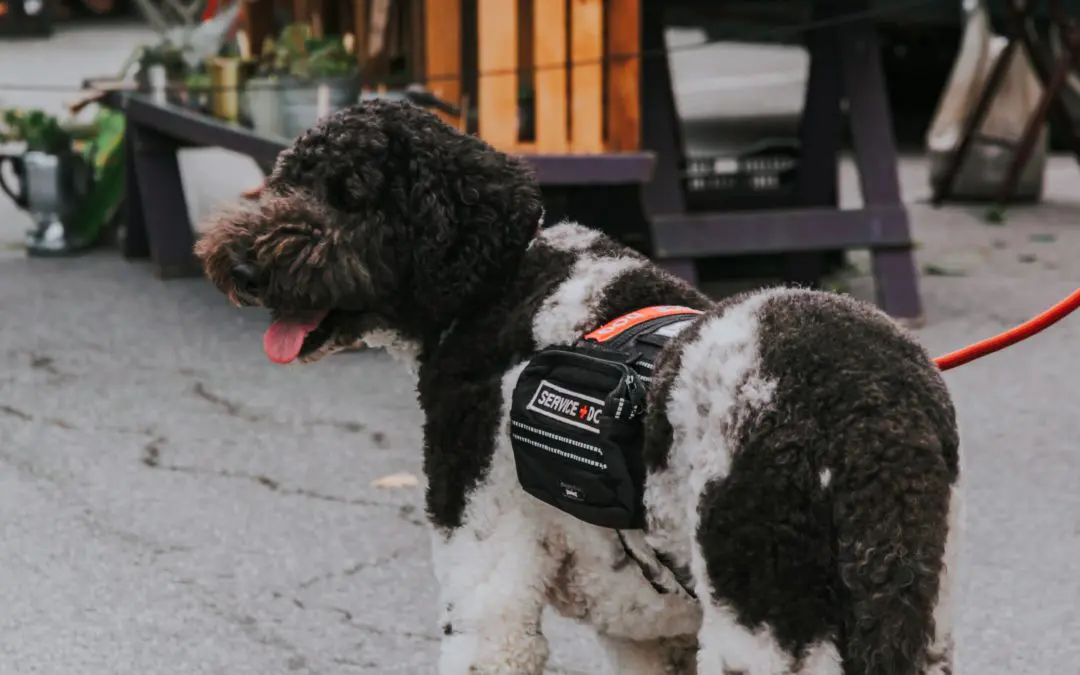Since the dawn of domesticated canines, dogs have played the role of both companion and service animal. As early as 74 CE, we have archeological evidence that dogs were being used to help the blind in ancient Rome. But it wasn’t until the 1990s that the role of a service animal was legally defined in the United States under the Americans with Disabilities Act (ADA).
September is National Service Dogs Month. And at East Valley Animal Hospital, we would like to honor these four-legged heroes by answering a few common questions about service dogs.
What is a service dog?
The ADA defines service animals as, “…dogs that are individually trained to do work or perform tasks for people with disabilities.” In order for a dog to be considered a service animal, the work or task they have been trained to provide must be directly related to the person’s disability.
The ADA is clear to note that dogs who provide emotional support do not technically qualify as service animals under the Act. However, those animals are still considered “assistance animals” under the Fair Housing Act.
What are the different types and breeds of service dogs?
There is a wide range of disabilities and conditions that can qualify a person for a service dog. Among them are vision and hearing impairment, mobility issues, autism, PTSD, mental disabilities and other psychiatric conditions. And certain breeds are best qualified to assist humans with varying tasks. These are the 5 most common types of service dogs and which breeds are trained to help:
1. Hearing Dogs
Dogs who assist owners with hearing disabilities are trained to alert their humans to sounds like doorbells, babies crying and other alarms by touching them and leading them towards the sound. The best hearing dogs are often small to medium-sized breeds like Cocker Spaniels and Miniature Poodles, Shih Tzus, and Terrier Mixes. Hearing dogs are often acquired from animal shelters.
2. Guide Dogs
Guide dogs for the visually impaired are some of the most common dogs you’ll see out and about. They are trained to help their owners avoid obstacles and move safely when walking or traveling. Most guide dogs are Golden Retrievers, Labradors and German Shepherds.
3. Mobility Assistance Dogs
There are a wide range of disabilities that inhibit people from being able to complete common daily tasks. Individuals who benefit from mobility assistance dogs often have arthritis, brain injuries, prosthetics, or those who are in wheelchairs. These dogs can be trained to open and close doors, bring objects and medications to their owner, press buttons, turn lights on and off, provide balance for their owner, and more. Common breeds that serve as mobility assistance dogs include Doberman Pinschers, Bernese Mountain Dogs, Golden Retrievers and Labradors.
4. Psychiatric Service Dogs
These dogs assist individuals who suffer from psychiatric or mental health issues such as PTSD, depression, obsessive-compulsive disorder and autism. They can be trained to help their owners manage their symptoms. For example, a dog helping someone diagnosed with OCD can be trained to paw at their owner who may not realize what they are doing. The simple act of caring for an animal can be supportive and healing to individuals with psychiatric disorders. Collies are intelligent and loyal and make great psychiatric service dogs.
5. Seizure Alert Dogs
Seizure alert dogs are trained to perceive and react to certain behaviors that precede a seizure. These dogs may also be trained to respond to their owner who is having a seizure by barking or pressing an alarm system to gain attention. These dogs can remove their owner from a dangerous environment (for example, if they fell and had a seizure in the middle of the road). They can also bring medications to first responders. The best dog breeds for seizures include Golden Retrievers, Labrador Retrievers, German Shepherds and Poodles.
Are service dogs required to wear a vest?
Service dogs are not required to wear a vest according to the ADA, however, it is highly recommended that they wear one when traveling with them or visiting a public space that may not ordinarily permit dogs, such as a restaurant or library. Since anyone with a dog can obtain a service vest, we also recommend carrying the service animal’s permit at all times.
Vet Care for Your Service Animal
In the United States, approximately 500,000 service dogs are increasing the quality of life of their owners. If you own a service dog in Gilbert, Arizona, East Valley Animal Hospital would be honored to care for your four-legged partner. Give us a call to schedule your next appointment.
Images used under creative commons license – commercial use (9/17/20). Photo by Ralph (Ravi) Kayden on Unsplash (9/17/2020)

